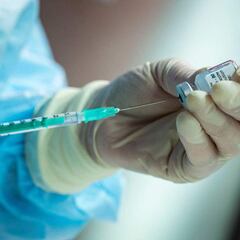What is a vaccine booster and why would people need it?
Several vaccines require a booster shot to strengthen the bodies immunity to a given virus, Moderna CEO says a third shot may be needed by September.

Some diseases you get only once while others can come back year after year, likewise with vaccines some you only need one shot while others lose effectiveness over time or an additional dose is needed to increase the effectiveness.
Currently there are three covid-19 vaccines authorized for emergency use in the US, the Johnson & Johnson is a one-dose vaccine while both the Moderna and Pfizer-BioNTech are two-dose vaccines, an initial shot and then a booster.
Also see:
- What is SM-102 and why are anti-vaxxers talking about it?
- Can an employer ask if you're vaccinated in the US?
- How long is the covid-19 vaccine effective for?
- Can the second dose of covid-19 vaccine be different from the first?
Two weeks after the Johnson & Johnson jab you are considered fully inoculated whereas with the other two the first shot gives you limited immunity. The second booster shot, 21 days after the first for Pfizer-BioNTech covid-19 vaccine and 28 days after the first for the Moderna covid-19 vaccine, tops up the body's ability to fight off infection resulting two weeks later in full immunity.
Although both the Moderna and Pfizer-BioNTech are two-dose vaccines, that does not make them interchangeable. In order to get the full benefit of the vaccines it is recommended to get the second dose as close to the stipulated date for its administration as possible.
"We know that the vaccine durability of the efficacy lasts at least six months, and likely considerably more, but I think we will almost certainly require a booster sometime within a year or so after getting the primary," said Dr. Anthony Fauci https://t.co/BHRtQwJXFm
— CNN (@CNN) May 20, 2021
How do booster shots work?
Vaccines give us different levels of protection from harmful viruses and bacteria. For some diseases more than one shot can be necessary, either to create a stronger immunity or to rebuild immunity as a virus mutates or the effectiveness of the vaccine itself wears off over time. Think of a tetanus shot every ten years or the flu shot every year.
In the case of the covid-19 shot, the length of time that it confers immunity hasn't been fully determined yet. So far, studies have shown the efficacy of the mRNA vaccines, those made by Moderna and Pfizer-BioNTech, to be robust maintaining more than 90% efficacy six months after getting vaccinated.
A booster would be better sooner than later
Related stories
The effectiveness of the current vaccines will be tested as new mutations are allowed to develop while the virus is not brought under control worldwide. Even though the existing vaccines have proven effective against the variants currently circulating in the US, the vaccine manufactures are investigating the potential use of boosters.
The first Americans to be vaccinated against the coronavirus could require a third "booster" shot as early as September, the CEOs of Pfizer and Moderna told Axios. https://t.co/T3t6fA8cmy
— Axios (@axios) May 20, 2021
The CEOs of Pfizer and Moderna told Axios that a booster shot would most likely be necessary for the nation’s vulnerable populations, including front-line workers starting in September or October. Although they acknowledge that there isn’t a rapid drop off in their vaccines’ effectiveness Moderna CEO Stéphane Bancel wrote in an email "I think as a country we should rather be two months too early, than two months too late with outbreaks in several places."


